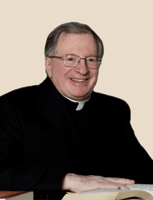I failed my first pastoral challenge. The failure still weighs on me because the person involved was so close to me: my grandmother. Nellie—Carmella was her given name—was a short, stout lady crowned with a head of soft, tight white curls. She was sweet and kind and as well-beloved as she was widely esteemed for her home cooking. The eldest of 10 surviving children of an Italian-American family, she had gone to work at age 9, first in a handkerchief factory and later in a cigar factory; and then at 16 she married my grandfather.
Grandma also possessed a toughness that many working-class women had in the early 20th century. In the days before hospital emergency rooms, for example, she was the neighborhood surgeon, sewing up the neighbors’ deeper cuts and gashes with needle and thread. One warm summer evening years later, Old Man Christian (that’s what she called my father’s father) brought home a tough old rooster in a burlap bag. It turned out no one at his boarding house had been able to slaughter it. He told them he knew a woman who would dispatch it; and so Grandma did, twisting off its head.
In social situations, I had never seen Grandma tough or prickly. But at one point in my seminary studies, some of her nephews, all of whom adored her, came to me and asked if I would intercede with her to reconcile with one of her younger sisters. The origin of their estrangement was obscure, but the distance and hurt were real. When I asked Grandma whether she would forgive the slight done her, she hesitated for a moment in a thoughtful, sad silence and then answered firmly, “No.” I was nonplused. She had never said no to me before, and I regret to say that’s where we left her nephews’ request.
For some people, even considering forgiving is a nearly impossible task. They pour enormous psychic energy into resisting the thought. Many voices would rule out forgiveness even in church life. When Sister Camille D’Arienzo wrote of her ministry in victim-offender reconciliation two years ago in these pages (“The Witness of Courage and Forgiveness,” 2/11/08), irate letters poured in protesting against encouraging victims to forgive their victimizers. Even Pope John Paul II met fierce opposition from cardinals and Curial officials when he undertook his ministry of apology and forgiveness.
We have a popular culture that thrives on nastiness, backstabbing and vengeance. Think of reality TV. The harshness of entertainment is not unlike our public life. In criminal and civil disputes, journalists, attorneys and advocacy groups work to keep victims’ pain alive and in public view. Some victims become convinced they are entitled to stoke their rage forever. To be sure, as we have seen in the crisis that arose over sexual abuse of minors by members of the clergy, the gay rights movement and the campaigns of the survivors of torture, it takes persistence and an outsized sense of offense to force others to see victims’ pain, make amends and assure that justice is done. But when persistence grows insensitive and unsupple, it becomes obduracy. When rage overtakes our lives, it degenerates into blind fury. Where there is no place for forgiveness, the hard but lesser virtues necessary for protest become toxic for society.
Those who offend us may not be willing to apologize. They may fear the consequences of admitting fault. But if we do not forgive, we become locked in a poisonous past, and often others with us. A freely proffered act of forgiveness can free everyone. Similarly, a willing apology can open a new beginning for all concerned. Thinking back now on my lack of response to my grandmother’s no, I wish I had asked her: “After a long life, what can two Christian women do but forgive each other?”









Maybe Carmella forgave her sister later on. Maybe Carmella reconsidered without telling her nephew. Who knows: to the nephew's credit, he does not judge Carmella, only himself. And maybe the decision not to further question Carmella's choice - which I consider a loving courtesy to Carmella - eventually warmed Carmella's soul.
We can all love each, and forgive, other without fanfare.
Not a bad thought for Holy Week. Opposition to abortion is easy - particularly if you have ever examined an aborted fetus (I saw a few during my years as an anatomic pathologist). But opposition to the death penalty is harder. You beautifully describe the process by which we fail to do what Christ could do - hang up there dying in horrible pain and say "Father forgive them for they know not what they do".
In addition, Rev. Christiansen dares to suggest that abuse survivors cannot think and act for themselves. Christiansen employs excuses and off handed remarks in his attempt to suggest his brand of "closure" for the abuse victims.
No matter how long winded Rev. Christiansen chooses to be, he cannot change the facts. Catholic priests who sexually abused children were protected by a veil of silence from their brother priests (Did Rev. Christiansen ever have knowledge and say nothing about a brother priest was abusing kids?)
Catholics everywhere continue to brag that their parish priest is a "good priest," I suppose, because their priest hasn't been accused of child sex abuse. So, where are these ordained priests today? What are their ministries really about? Why aren't they in solidarity and communion with the vulnerable and hurting kids who were abused and now seek a measure of justice?
Rev. Christiansen mentions nothing about the bishops who knew about the abusers and did nothing to protect children. When will Rev. Christiansen demand that the bishops resign from their leadership positions in the church?